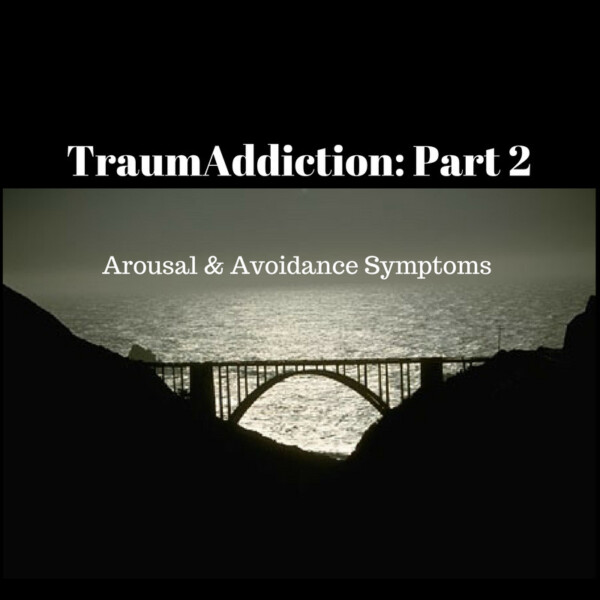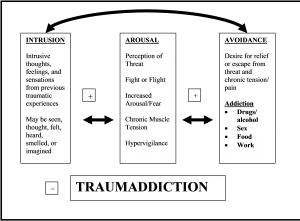TraumAddiction:
Safety and Stabilization for the Addicted
Survivor of Trauma
by
Eric Gentry, Ph.D, LMHC, CAC, CTS
Amy Menna, LCSW
Marjie Scofield, MSW
April 1, 2004
Arousal Symptoms
Brad feels anxious and decides to smoke a cigarette hoping it will calm his nerves. He can feel his heart racing and is afraid that he will have a panic attack. His lighter is not working in the wind and he becomes increasingly agitated. As he returns to work he is irritable and starts to notice his coworkers “not doing anything.” His heart rate rises and he feels pressure in his chest. There is a sinking feeling in the pit of his stomach that will not go away.
Brad, seeking someone to talk with, comes up behind Erica and taps her on his shoulder. She jumps back and turns around ready to defend herself as she was taught in self-defense class. He is annoyed by her reaction and tells her to “just relax.” Erica’s response was far more intense than she would have anticipated. Her level of arousal was high to begin with and Brad unexpectedly approaching her from behind simply put her over the edge. Erica feels that she needs a break. She, too, goes out to smoke a cigarette only she cannot hold the lighter because she is trembling. Her heart races and she takes a deep breath to calm the pounding of her chest.
Brad is experiencing a great deal of discomfort and is unable to relax. He is experiencing what is known in the addiction realm as being restless, irritable, and discontent. He is plagued by thoughts and physical urges to satisfy his craving. It is as if his insides are screaming for the temporary relief drugs can bring him. He begins to “romance” the idea of using again without a thought towards many of the negative consequences he has suffered from his drug use.
Erica continues to feel the pressure in her chest and finds it hard to take a full breath. She is constantly scanning the room as the feeling of danger lingers. With respect to trauma, these are known as arousal symptoms. Her body has become ‘on alert’ as she perceives her safety has been threatened. She find that she is plagued with a nagging yet comforting thought that a drink would “calm her nerves.”
Avoidance Symptoms
Erica decides that she is too “stressed out” to continue work. She tells her boss that she is having stomach problems and needs to go home. She plans on cooking a nice dinner and then relaxing the rest of the evening. Because she has had such a difficult day, she calls her sponsor and leaves a message saying she is unable to make the AA meeting.
Brad also chooses to take the rest of the day off. He calls his girlfriend to cancel their dinner plans telling her that he is too tired. Brad cannot seem to stop his inner trembling. He is extremely agitated and continues to reminisce about the relief cocaine would provide. On the way home, he decides to go to a movie, hoping this will help distract him from his thoughts of using drugs.
Earlier this morning, both Brad and Erica had good intentions for the day. Although they had some difficulties throughout the night, they woke up with a strong commitment to recovery. Both were able to maintain their intentionality—in this case, continued recover–throughout the morning. During the morning, both were able to direct their behaviors in ways that they wanted to behave. However, throughout the day they became reactive and began to fall victim to environmental cues (smells, thoughts, images, feelings) that provoked memories of their previous traumatic experiences. This recall of trauma, either consciously or unconsciously, produced feelings of increased arousal, fear, and muscle tension. This fear and tension involuntarily compels Brad and Erica to shift from the parasympathetic nervous system (relaxation, comfort, and intentionality) to the sympathetic nervous system (fight-or-flight, survival, irritability, and escape).
Brad and Erica’s good intentions for the day have been thwarted. They are now experiencing such high anxiety that escape feels necessary. Both are experiencing the dissolve of their commitment to recovery as thoughts of using drugs/alcohol promise escape from the fear, irritability, and tension—they are in a reactive state. As the perceived threats and the accompanying discomfort escalate, their perceived options diminish until it feels like reckless escape is all that remains.
On the way home, Erica drives by the park where the rape had taken place. She often avoids this route as it reminds her of the rape, but today there is road construction and she has no other choice. As she unwillingly glances over at the park she thinks she smells the scent of the cologne the rapist had worn. She remembers the strong musky smell and feels as if she cannot breathe. She cannot believe this feeling of overwhelming fear is happening to her twice in one day. She feels as though she may be “going crazy”. Believing in the moment that she has no other way to survive these feelings of panic, she turns into the liquor store parking lot. She buys a bottle of her favorite wine and starts drinking it on her way home. Almost immediately she experiences a feeling of warmth throughout her body. As her body begins to relax from the effects of the alcohol, the intensity of her emotions begins to lessen.
Brad left work intending to go a movie. However, his anxiety was so high, he felt he would be unable to sit still. On a whim he decides to go for a drive and heads for the beach to relax and walk off some nervous energy. Instead, his car takes the exit to the area where he used to buy drugs. Before he knows it, he is driving down the same street where he was so violently beaten just months before. He starts to reconsider, realizing how much better his life has become since he has stopped using drugs. Suddenly he sees the alley where he was left for dead and begins to re-experience the terror he felt then. His anxiety heightens and Brad frantically scans the street for a drug dealer. All he can think about now is his desperate need for relief. He agitatedly finds his old drug dealer and purchases crack cocaine. Smoking it on the way home, he finally quiets the inner turmoil.
Embroiled in Addiction
Both Brad and Erica find themselves again embroiled in their addiction. “How did this happen?” they both ask themselves. “What is wrong with me? I should know better. I am a hopeless failure,” become the familiar refrain of thoughts that now plague each of them. They have become hopeless, depressed, and accelerating into the desperate tailspin of TraumAddiction.




